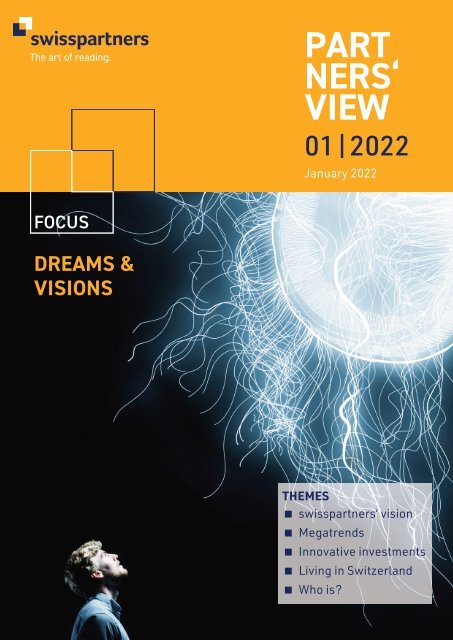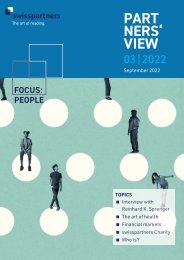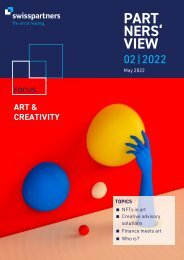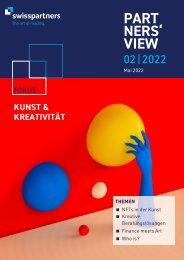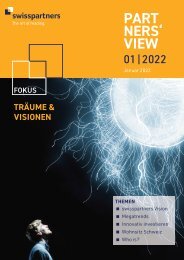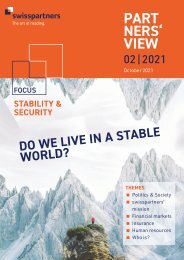Partners' View 3|2022 english
Create successful ePaper yourself
Turn your PDF publications into a flip-book with our unique Google optimized e-Paper software.
The art of reading.<br />
PART<br />
NERS‘<br />
VIEW<br />
01|2022<br />
January 2022<br />
FOCUS<br />
DREAMS &<br />
VISIONS<br />
WIE STABIL IST DIE WELT?<br />
THEMEN<br />
< Politik &<br />
Gesellschaft<br />
THEMES < swisspartners-<br />
< swisspartners‘ Mission vision<br />
< Megatrends < Finanzmarkt<br />
< Innovative < Versicherungen<br />
investments<br />
< Living < Human in Switzerland Resources<br />
< Who < Who is? is?
DREAMS &<br />
VISIONS<br />
PART<br />
NERS‘<br />
VIEW<br />
ISSUE 03
EDITORIAL<br />
A<br />
A new year lies ahead. And after a<br />
period largely ruled by the Covid<br />
pandemic, nobody knows what it holds<br />
in store. The swisspartners editorial<br />
team has consequently chosen to<br />
embrace a bold, future-focused theme<br />
for this latest edition of Partners’ <strong>View</strong>:<br />
Dreams & Visions.<br />
Writing this editorial, a quote from<br />
German poet and publicist Jean Paul<br />
comes to mind – one I already found<br />
inspiring in my student days: “Let us<br />
forever embroider the great dream of<br />
life with smaller dreams of colour and<br />
light.” That I would like to offer you, our<br />
readers, as an inspirational thought for<br />
2022. In times of crisis especially,<br />
dreams and visions are important and<br />
to be encouraged. They help us focus<br />
on the future.<br />
The world is changing at a rapid pace.<br />
swisspartners, too, a company with<br />
nearly 30 years of tradition, will break<br />
new ground this year. In the lead<br />
interview, CEO Markus Wintsch gives a<br />
personal glimpse into his dreams and<br />
his vision for the swisspartners Group.<br />
According to the Zukunftsinstitut think<br />
tank, 12 megatrends will shape the<br />
future development of society, business<br />
and culture. Trends researcher<br />
Matthias Horx invites us to dream<br />
‘ahead’ and shape a better future.<br />
Are you dreaming of relocating to<br />
Switzerland? With the help of the<br />
swisspartners Wealth Services,<br />
which span the entire process of<br />
relocating, that wish could soon come<br />
true.<br />
Sustainable and future-proof<br />
investments are in strong demand.<br />
Nick Jenni, Co-Head of Investment<br />
Management & Solutions at<br />
swisspartners, sets out the options<br />
available. Last but not least, in our<br />
‘Who is?’ column, we present a<br />
colleague from swisspartners Vaduz,<br />
Liechtenstein who contributes to the<br />
team spirit with a wholeheartedly<br />
positive outlook on life.<br />
I wish you an inspiring read.<br />
Yours<br />
Simone Töllner<br />
Head of Marketing<br />
PARTNERS‘ VIEW | Editorial 3
CONTENTS<br />
4 Contents | PARTNERS‘ VIEW
THE POTENTIAL OF NOW 6<br />
Lead article by Markus Wintsch<br />
DRIVERS OF CHANGE 9<br />
The 12 megatrends identified by Zukunftsinstitut<br />
HOPE BEYOND THE CRISIS 12<br />
Interview with Matthias Horx<br />
TRADITION MEETS INNOVATION 14<br />
Nick Jenni on innovative investments<br />
THE DREAM OF LIVING IN<br />
SWITZERLAND 16<br />
swisspartners Wealth Services<br />
WHO IS? 18<br />
Profile: Natascha Beck<br />
PUBLISHING INFORMATION 19<br />
PARTNERS‘ VIEW | Contents 5
THE POTENTIAL<br />
OF NOW<br />
MARKUS WINTSCH, CEO<br />
SWISSPARTNERS GROUP, TALKS<br />
OF VISIONS BOTH PERSONAL AND<br />
PROFESSIONAL – AND WHY<br />
INTENSIVE ENGAGEMENT IS KEY<br />
TO KEEPING CUSTOMERS HAPPY.<br />
Interview by Kathrin Meister.<br />
„ swisspartners is<br />
like a big family<br />
with a strong team<br />
spirit.”<br />
Markus Wintsch, what are your personal and professional<br />
goals for 2022?<br />
Personally, I aim to live life more consciously, savouring every<br />
day and every moment more intensively than ever. It’s often<br />
the little things in life that are important. A walk in the woods<br />
or listening to music in the car while waiting in traffic. I’m a<br />
great fan of living in the moment. I neither mourn for the past,<br />
nor do I long for the future. What counts is the here and now.<br />
Professionally, I’d like to take more time for my clients. I don’t<br />
mean discussing business with them – I want to know them<br />
better. Their fears, their hopes, their wants and needs. For<br />
those kinds of talks, you need a more intimate setting – and,<br />
of course, more time. Giving clients time shows them that<br />
they are valued. The better I know our clients, the better I can<br />
help them meet their needs.<br />
My second work-related goal for 2022 is to lead swisspartners<br />
into a secure future. We currently stand at a crossroads in the<br />
Swiss wealth management sector. We’ll see considerable<br />
change in this market over the next two years. So we aim<br />
to strengthen our market position, continue to work on a<br />
sustainable strategy and secure the financial resources we<br />
need.<br />
6 Lead article: Dreams & Visions | PARTNERS‘ VIEW
You’ve been CEO at swisspartners since January 2001. 21<br />
years is a long time. What visions have you made reality –<br />
and what accomplishments give you a sense of pride?<br />
swisspartners has served an international client base with<br />
diverse needs for almost 30 years now. I’m proud to have<br />
helped build a company that’s not only financially sound, but<br />
also provides secure jobs for around 100 employees. Many of<br />
them have worked with us for years, some even way beyond<br />
retirement age, because they really enjoy their work.<br />
swisspartners is like a big family with a strong team spirit. I<br />
also tend to see my employees’ families as part of our extended<br />
family team.<br />
Architectural changes are on the agenda at the Zurich<br />
premises. Could you tell us a little about your reasoning and<br />
plans?<br />
It’s been 29 years since swisspartners opened offices at its Am<br />
Schanzengraben address in Zurich. We have the benefits of a<br />
central location, but in an idyllic river setting. After many years<br />
in the accustomed office layout, we want to move into the<br />
modern world with a little interior refreshment. We’ll actually<br />
be giving up around a quarter of our Zurich office space. That’s<br />
in response to the ongoing home working trend, digitalisation<br />
of our work processes, and our mobile consultant team.<br />
We’ll be starting with the building work in the second quarter<br />
of 2022. We’re planning an open, light-filled office space. With<br />
a lounge-type design, we want to offer both clients and<br />
employees a pleasing, welcoming atmosphere. We will also<br />
provide quiet areas where people can work undisturbed –like<br />
silent boxes and discreet meeting zones. The new interior<br />
promotes flexibility and open encounter. Clients will now enter<br />
a modern, bright reception area on the ground floor. Without<br />
giving too much away, I’d say it’s going to be very attractive<br />
indeed.<br />
What role do collaboration and mergers play in<br />
swisspartners’ future success?<br />
I believe that in the finance industry, collaboration and mergers<br />
are the key to future survival for players of a certain size.<br />
Mergers are needed to secure a healthy growth rate. But size<br />
matters as well – a company must be of a certain size to be<br />
able to survive. Lacking sufficient volume is a bit like a<br />
12-cylinder engine only running on eight because it’s low on<br />
oil. Lasting financial stability can only really be achieved with<br />
an adequate company size. When selecting potential<br />
candidates for mergers, we aim for a good fit between their<br />
consultancy and investment philosophy – and customer focus<br />
– and our own values and principles here at swisspartners.<br />
In the finance sector, meeting people’s need for ‘all-in’ service<br />
makes collaboration indispensable. Building a solid network<br />
of specialists – say in international tax and real estate<br />
consultancy – makes it possible to meet client needs that are<br />
„<br />
not covered by your own portfolio.<br />
My goal for 2022 is<br />
to lead swisspartners<br />
into a secure future.”<br />
Markus Wintsch<br />
CEO swisspartners Group AG<br />
markus.wintsch@swisspartners.com<br />
PARTNERS‘ VIEW | Lead article: Dreams & Visions 7
What would you say is especially important to swisspartners’<br />
clients going forward?<br />
One particular need stays constant whatever the situation:<br />
Clients want personal, open communication. If I meet a client<br />
for a consultation (in person whenever possible), I show<br />
genuine interest in the topics they want to discuss and in their<br />
individual concerns. I try to put myself in my clients' position,<br />
to understand their motivations and perhaps also their fears.<br />
For me, encounters like that are true quality time.<br />
In a world that poses a range of challenges – on top of those in<br />
the current crisis – it’s important to make clients feel that<br />
swisspartners looks after them, as well as their wealth, with<br />
great expertise and care. The more uncertain the world<br />
becomes, the more diverse the challenges we face, the more<br />
our clients must be able to sleep at night, secure in the<br />
knowledge that with us their portfolios are in safe hands.<br />
You’ve achieved a lot in your lifetime. Do you still have<br />
dreams for the future?<br />
I fulfilled my dream early, as a young man at the age of 27. My<br />
dream was to be independent and to run my own business.<br />
That entrepreneurial spirit has stayed with me and drives me<br />
to this day.<br />
I live my dreams and what I don’t live, I don’t dream. I’m happy<br />
with things as they are. The coronavirus crisis has shown us<br />
that material dreams are not the key to personal happiness<br />
and satisfaction. I have no further needs. My dream is to live<br />
my life just as it is right now – spending quality time with my<br />
family, my clients and the swisspartners team. And consciously<br />
shaping my days. You can live your dreams far better if you<br />
don’t take yourself too seriously or believe that you can’t be<br />
replaced. Modesty in everything always pays off.<br />
Our clients also attach great importance to the next generation,<br />
to ensuring that the successors to whom they’ll pass on their<br />
wealth are equally comfortable with the thought of doing<br />
business with swisspartners. Young people also want personal<br />
encounter and service when seeking advice. We like to know<br />
that clients’ children and their children’s children can identify<br />
with the asset and investment management consulting<br />
philosophy we follow at swisspartners.<br />
„<br />
I live my dreams<br />
and what I don’t live,<br />
I don’t dream.”<br />
8 Lead article: Dreams & Visions | PARTNERS‘ VIEW
MEGATRENDS AS<br />
DRIVERS OF CHANGE<br />
THE FUTURE IS ALREADY HERE TODAY. WE MAY STILL BE IN A<br />
PHASE OF TRANSITION, BUT TIMES ARE DEFINITELY CHANGING.<br />
WHAT ARE THE TRENDS AND MEGATRENDS ALREADY SHAPING<br />
LIFE AS WE KNOW IT TODAY? AND WHAT CAN WE INFER FROM<br />
THEM FOR THE FUTURE OF SOCIETY, BUSINESS AND CULTURE?<br />
FROM ITS OFFICES IN FRANKFURT AND VIENNA, RENOWNED<br />
THINK TANK ZUKUNFTSINSTITUT HAS IDENTIFIED 12 MEGA-<br />
TRENDS EMERGING IN OUR CURRENT, UNCERTAIN TIMES, AND<br />
SHINES THE SPOTLIGHT ON WHAT NEEDS TO BE DONE TODAY.<br />
PARTNERS‘ VIEW | Megatrends 9
01 MEGATREND INDIVIDUALISATION<br />
Individualisation – the reigning cultural principle in the<br />
western world – is gaining an increasing hold across the globe.<br />
A complex megatrend that has long peaked in many of our<br />
richest nations, it now forms the backbone of our social<br />
structure. Individualisation shapes value systems,<br />
consumption patterns, lifestyles and cultures in equal<br />
measure. While in essence it equates to freedom of choice, its<br />
complex effects give rise to seemingly countervailing trends<br />
such as the ‘we culture’, along with new imperatives and<br />
constraints. In the COVID-19 pandemic, solidarity and<br />
community spirit have become increasingly more important<br />
than exclusion and ‘me first’, thus fuelling the shift towards<br />
post-individualisation.<br />
02 MEGATREND GENDER SHIFT<br />
In the gender shift era, gender no longer preordains the paths<br />
we follow – be it when choosing a career or deciding what<br />
clothes we wear. Never before has the fact that someone is<br />
born as a woman or a man said so little about the direction<br />
their life will take. Giving rise to a new pluralism culture, this<br />
dismantling of gender stereotypes has ushered in radical<br />
change – both in the business world and in society at large.<br />
The coronavirus pandemic has only served to foster this trend.<br />
Bringing existing disparities to light, it’s acting as a catalyst,<br />
forcing people to reflect on a society that appears equal at first<br />
face.<br />
03 MEGATREND SILVER SOCIETY<br />
The world’s populations may be ageing, but people are staying<br />
healthy for longer than ever before. Today’s silver society hails<br />
a completely new way of living in the ‘third stage’ of life – a<br />
phase that’s becoming longer, empowering ‘silver seniors’ to<br />
embrace self-development and find fulfilment in old age.<br />
Waving goodbye to the quest for eternal youth and lending new<br />
meaning to age and ageing, this silver mindset paves the way<br />
for a healthier, more active society born of this different<br />
definition of age. The Covid pandemic has come as a backlash<br />
to the free ageing trend – ‘age’ is suddenly synonymous with<br />
‘risk group’, a much less attractive term.<br />
04 MEGATREND KNOWLEDGE CULTURE<br />
Society is more knowledgeable than at any time in the past.<br />
Around the world, education levels are at an all-time high. Most<br />
of all in combination with the megatrend of connectivity, our<br />
knowledge of the world and the way we deal with information<br />
– our knowledge culture – is changing. It’s thanks to the<br />
pandemic that education has finally become digital, moved<br />
online, and that the collaborative, distributed structures<br />
needed for knowledge generation have been fostered along<br />
with innovative thinking.<br />
05 MEGATREND NEW WORK<br />
The new work megatrend describes an epochal transition that<br />
starts questions of meaning and purpose and completely<br />
redesigns the world of work. Hailing the era of the creative<br />
economy, it signals the move away from meritocratic ideals.<br />
‘New work’ places individual development potential firmly<br />
centre stage – in the workplace of the future, what counts is<br />
symbiosis between work and everyday life. Enter the coronavirus<br />
crisis, emerging as a driver of the new work trend,<br />
making work more agile and more flexible and taking it more<br />
online. This outcome is set to stay.<br />
06 MEGATREND HEALTH<br />
Health is synonymous with quality of life. As an important life<br />
goal, this megatrend has become firmly fixed in people’s minds,<br />
in national cultures, in how societies see themselves – and<br />
shapes all areas of life. With health and happiness increasingly<br />
difficult to prise apart, the COVID-19 pandemic has brought<br />
people’s perception of health as a self-optimisation process<br />
right back down to earth. Health is now being seen as the<br />
absence of ill-health, meaning illness – and as something that<br />
affects not just us as individuals, but those around us as well.<br />
10 Megatrends | PARTNERS‘ VIEW
07 MEGATREND NEO-ECOLOGY<br />
Environmental awareness has transitioned from a lifestyle<br />
choice to a movement of huge social scale. While the<br />
megatrend of neo-ecology is shifting the values of global<br />
society, lifestyle culture and policymaking, it’s also turning<br />
entrepreneurial thinking and action completely on their heads.<br />
In the wake of the coronavirus crisis, this megatrend is opening<br />
people’s eyes – the pandemic acts as a forceful reminder that<br />
not only are we part of nature, but that nature cannot be truly<br />
harnessed or controlled. By pushing our reset buttons, it has<br />
opened the door to a post-pandemic society shaped by<br />
sustainable development notions and a slower pace of life.<br />
08 MEGATREND CONNECTIVITY<br />
The principle of connectedness has long dominated social<br />
change, opening up a new chapter in societal evolution. Digital<br />
communication technologies are reprogramming sociocultural<br />
codes, creating new lifestyles, attitudes and behaviours. This<br />
already powerful trend towards connectivity gained an extra<br />
boost when the coronavirus crisis moved many of our<br />
interpersonal encounters online. The pandemic has effectively<br />
pulled digitalisation out of the future and into the present day.<br />
09 MEGATREND GLOBALISATION<br />
The trend towards globalisation is often blamed for making the<br />
world fragmented and more complex, for fostering trade wars,<br />
diplomatic spats, cyber hacking and global mega-corporations<br />
running roughshod over national laws. How do we deal with<br />
our hyper-connected, mega-complex world? The big dilemma<br />
in all of this comes in our attempts to regulate global-level<br />
processes and problems with national-level policies and tools.<br />
In the COVID-19 crisis, this has been thrust into the spotlight,<br />
further driving the glocalisation trend in which the global and<br />
the local are combined in novel ways.<br />
10 MEGATREND URBANISATION<br />
In the COVID-19 pandemic, urban living has seen far more<br />
change and disruption than has rural life. Previously, city<br />
dwellers took their mobility for granted along with a quality of<br />
life enhanced by everything cities have to offer. The pandemic<br />
has since put paid to some of the benefits associated with city<br />
life. In lockdown, home became the place to be, taking on a new<br />
importance as social life came to a standstill. Although urban<br />
hospitality sectors and cultural programmes are slowly<br />
recovering, it’s hard to predict when city life will return to<br />
normal again. The shift in emphasis to the home is here to stay<br />
and will accompany the urbanisation megatrend into the<br />
future.<br />
11 MEGATREND MOBILITY<br />
Of all the recent megatrends, mobility has been hit hardest in<br />
the coronavirus pandemic – it was virtually brought to a halt.<br />
Our connected society has a constantly growing need for travel<br />
and for access to an increasing range of alternative transport<br />
modes – the future of mobility is connected, digital, post-fossil<br />
and shared. Prior to the pandemic, mobility was simply part of<br />
everyday life that was becoming faster and more complex<br />
by the day. When national borders were closed and access<br />
restrictions introduced, the pace of life suddenly slowed and in<br />
some places everything stopped. It seems mobility and travel<br />
will be viewed differently in the post-pandemic world.<br />
12 MEGATREND SECURITY<br />
Society is in a constant state of alarm: one crisis leads to<br />
another and the pandemic has made it abundantly clear just<br />
how uncertain and fragile our lives and our surroundings<br />
are. More than ever, security is the order of the day – for<br />
individuals, for society, and also as a key value proposition in<br />
selling things. But notions that the world is becoming less and<br />
less secure can be deceptive to say the least – the world as we<br />
know it today is the safest it’s ever been.<br />
Source: www.zukunftsinstitut.de<br />
THE ART<br />
ABOUT<br />
OF REAL<br />
ZUKUNFTSINSTITUT<br />
ESTATE<br />
Founded in 1998, Zukunftsinstitut has offices in Frankfurt<br />
and Vienna. It played a key role in shaping German<br />
trends and futures research right from its inception. The<br />
Institute is now one of Europe’s most influential think<br />
tanks on trends and futures research. Be it for decisionmakers<br />
or forward-thinkers, Zukunftsinstitut is now a<br />
prominent source of information and inspiration.<br />
PARTNERS‘ VIEW | Megatrends 11
Photo © Klaus Vyhnalek | www.vyhnalek.com<br />
HOPE<br />
BEYOND THE CRISIS<br />
AN INTERVIEW WITH<br />
MATTHIAS HORX,<br />
FOUNDER OF ZUKUNFTSINSTITUT<br />
.<br />
Interview by Kathrin Meister.<br />
In your new book, Die Hoffnung nach der Krise (Hope beyond<br />
the Crisis), you describe the key mindshifts post-pandemic.<br />
Can you give some insight into what that’s all about?<br />
The coronavirus pandemic has served us some inconvenient<br />
truths that we simply cannot ignore. Take our poor relationship<br />
with nature, the source of the virus outbreak. And the fact<br />
our society harbours a lot of division and unhappiness. In<br />
responding to the current situation, many people will change<br />
their way of thinking and how they interact with others. What<br />
it comes down to is changing how we view the environment<br />
and finding more resilient ways to coexist on planet earth. This<br />
also means a more flexible, vibrant world of work. During the<br />
pandemic, many people opted for new lifestyles enabling them<br />
to live with other people and with nature in a better way than<br />
before.<br />
12 Interview with Matthias Horx | PARTNERS‘ VIEW
What can companies do to operate successfully in the<br />
economy of the future?<br />
They can accept the fact that the OLD NORMAL won’t be coming<br />
back because it no longer exists. For the past 50 years, we’ve<br />
lived in a frenzy of always wanting MORE: more clothes, more<br />
passengers on cruise ships, cheaper flights, cheaper meat. In<br />
the main, companies’ value creation processes have focused<br />
on maximum efficiency. But at some point, the price they had<br />
to pay in achieving that simply became too high. In the future,<br />
things will be BETTER: how can we build more environmentally<br />
sound cars? How can we produce steel without emitting<br />
endless quantities of carbon into the air? And how can we<br />
overcome constant over-stimulation and the demands<br />
experienced in daily media use? In the future, the focus will be<br />
more on PURPOSE than objective – on the underlying<br />
REASONS why companies need to seek solutions to problems<br />
that actually exist. It’s less about reduction and restraint and<br />
more about enrichment.<br />
„ We’re moving into<br />
an era of major<br />
transformation.”<br />
Matthias Horx<br />
Zukunftsinstitut cites 12 megatrends as drivers of change.<br />
Which of them influences your vision for the future most?<br />
The key trend in my view is NEO-ECOLOGY. With that I mean a<br />
definition of environmental awareness that is neither passive<br />
nor guilt-ridden and doesn’t call for renouncement and regret.<br />
We’re moving into an era of major transformation that calls<br />
for us to go without fossil fuels and build new systems for<br />
renewable energy consumption and materials supply. On many<br />
levels, that means changing the way we think and feel. When<br />
exploring processes and searching for symbioses, we can learn<br />
a lot from nature. If we achieve the transformation – which we<br />
will – then our quality of life as a modern civilisation can also<br />
be improved.<br />
So dreams are still possible in the new, future world? How<br />
about your dreams: how do they look right now?<br />
I dream pretty well. The idea isn’t for people to be constantly<br />
influenced by negative thoughts and fears. Those who are no<br />
longer able to dream ‘ahead’, into the future, won’t have an<br />
easy life. In many cases, it’s our bad dreams that show us how<br />
to let go of things from the past. Dreams are the brain’s way of<br />
getting rid of clutter. Fears dissipate just like the images in our<br />
dreams.<br />
THE ART ABOUT OF REAL MATTHIAS ESTATE HORX<br />
Matthias Horx is a trends and futures researcher,<br />
publicist and visionary. Already as a young technophile<br />
in the 1960s, he was interested in the mysteries of the<br />
future. After a career as a journalist and publicist, he<br />
became the most influential futurist in the Germanspeaking<br />
world.<br />
He has published some 20 books, many of which have<br />
become bestsellers. He founded Germany’s most<br />
important think tank for the future, the Zukunftsinstitut<br />
with headquarters in Frankfurt and Vienna. A passionate<br />
European, he commutes between London, Frankfurt and<br />
Vienna, where he has lived with his family since 2010, in<br />
the “Future Evolution House”.<br />
Source: www.horx.com<br />
PARTNERS‘ VIEW | Interview with Matthias Horx 13
TRADITION<br />
MEETS<br />
INNOVATION<br />
Sustainability is a key issue everywhere. At swisspartners,<br />
too, we are seeing strong demand for sustainable<br />
investments. Per 1 January 2022, we officially launched<br />
our sustainability strategy in asset management.<br />
swisspartners clients now have the choice: Do I opt for a<br />
more ‘conventional’ investment strategy, or should I go<br />
for an investment product centred on factors such as<br />
sustainability and corporate social responsibility?<br />
THREE-STEP PROCESS TO EVALUATE AND SCREEN<br />
FOR SUSTAINABILITY<br />
The financial markets so far lack a set of uniform<br />
sustainability standards. swisspartners has developed a<br />
three-step approach to evaluate how well an investment<br />
meets clear-cut sustainability criteria, based on<br />
databases such as Morningstar (Sustainalytics).<br />
STEP 1: EXCLUSION CRITERIA<br />
First of all, the swisspartners experts use database filters<br />
to exclude specific sectors and activities that are a no-go<br />
in terms of sustainability. Examples include weapons<br />
manufacture or trading, nuclear power and environmental<br />
destruction (coal-fired power plants), the tobacco<br />
industry, and human or labour rights violations.<br />
NICK JENNI, CO-HEAD OF<br />
INVESTMENT MANAGEMENT &<br />
SOLUTIONS AT SWISSPARTNERS,<br />
ON SUSTAINABLE AND FUTURE-<br />
PROOF INVESTMENTS<br />
STEP 2: BEST-IN-CLASS-APPROACH AND POSITIVE<br />
SCREENING<br />
The best-in-class-approach allows swisspartners cherrypick<br />
the companies with the best sustainability<br />
performance in a specific sector. To this end, potential<br />
investees are ranked against their sectoral peers on the<br />
basis of sustainability ratings. Only companies with at<br />
least a specified minimum rating are eligible for<br />
investment.<br />
Contrary to filtering out the negatives, in this positive<br />
screening approach we pinpoint candidates based on<br />
upside criteria such as environment-friendly products<br />
and good corporate citizenship.<br />
14 Innovative investments | PARTNERS‘ VIEW
STEP 3: ENSURING TRANSPARENCY<br />
The funds we select for our investors must provide<br />
transparent sustainability data in Morningstar’s analysis.<br />
If they fail to do so, we seek out alternatives wherever<br />
possible.<br />
INNOVATIVE INVESTMENT: DIGITAL ASSETS<br />
Another strong growth market alongside sustainable<br />
investment relates to digital investments such as<br />
cryptocurrencies. Beginning in summer 2021, swisspartners<br />
has extended its comprehensive range of services to<br />
include the management of digital assets. Thanks to a<br />
partnership with Sygnum, a regulated Swiss bank, our<br />
private clients are able to hold digital assets with us as<br />
asset managers – securely and in full compliance with<br />
the rules. In addition to efficient trading in cryptocurrencies,<br />
this partnership also simplifies safekeeping with regard<br />
to digital assets. Investors for whom the minimum<br />
investment in this approach is too high have various<br />
alternatives:<br />
BLOCKCHAIN: INNOVATION MEETS TRADITION<br />
In addition to cryptocurrencies, a further new technology<br />
offering attractive investment opportunities is blockchain.<br />
This technology is growing in importance across many<br />
different sectors. Together with external partners, swisspartners<br />
identifies and analyses business areas where<br />
new ventures are springing up – mostly in the form of<br />
private equities or startups.<br />
Traditional industries are also looking to future uses<br />
of blockchain. Established names such as Microsoft,<br />
Amazon and Continental are taking a highly futureoriented<br />
approach and anticipate strong long-term<br />
returns. So even a ‘conventional’ portfolio can be highly<br />
innovative.<br />
Nick Jenni, Partner<br />
Co-Head Investment Management & Solutions<br />
nicola.jenni@swisspartners.com<br />
< Exchange-traded products based on<br />
cryptocurrencies<br />
< Investment funds<br />
< Certificates<br />
< Personal wallets
THE DREAM<br />
OF LIVING IN<br />
SWITZERLAND<br />
HIGH QUALITY OF LIFE, EXCELLENT INFRASTRUCTURE,<br />
POLITICAL STABILITY AND TAX BENEFITS: MANY<br />
PEOPLE RIGHTLY DREAM OF LIVING IN SWITZERLAND.<br />
SWISSPARTNERS PROVIDES SUPPORT, ADVICE AND<br />
ASSISTANCE THROUGH THE ENTIRE PROCESS OF<br />
RELOCATING THERE.<br />
YOUR PARTNER IN CHARGE:<br />
Ralph P. Schuler, Partner<br />
Head of Tax & Fiduciary Services Switzerland<br />
ralph.schuler@swisspartners.com<br />
16 Living in Switzerland | PARTNERS‘ VIEW
The swisspartners Wealth Services<br />
team supports wealthy individuals<br />
and entrepreneurs in the areas of<br />
tax advice, fiduciary services and<br />
business consulting. We also provide<br />
customised relocation services<br />
(advice on transferring domicile to<br />
Switzerland) as well as real estate<br />
and property services (purchases<br />
and sales/management).<br />
RELOCATION SERVICES<br />
Are you thinking of relocating to<br />
Switzerland? In its relocation<br />
services, swisspartners provides<br />
full-service support for all questions<br />
and decisions in this connection.<br />
What rules and regulations apply<br />
in Switzerland? What do I need to<br />
watch? We advise on all matters<br />
surrounding relocation to<br />
Switzerland:<br />
< Immigration law<br />
< Approval procedures<br />
< Social security law<br />
< Tax law<br />
< Canton-specific tax rates and<br />
tax charges<br />
Our relocation services also cover<br />
various other areas:<br />
< Optimising your departure<br />
from your home country<br />
(‘exit taxation’)<br />
< Support in finding suitable health<br />
and other insurance, schools and<br />
domestic staff<br />
< Comprehensive advice on<br />
financial, tax and lifestyle<br />
matters, including after<br />
successful relocation to<br />
Switzerland<br />
WHEN WISHES COME TRUE<br />
The process starts with identifying<br />
the kind of location you want and<br />
deciding on a canton. Do you plan<br />
Switzerland to be your new main<br />
place of residence or will it be your<br />
second home? What is your ideal<br />
location, including for tax purposes?<br />
The next step is to find a suitable<br />
property in Switzerland.<br />
swisspartners offers excellent real<br />
estate and property services on fair<br />
terms. These include legal and<br />
personal advice for real estate<br />
purchases and monitoring of the<br />
construction process if you decide in<br />
favour of a new build.<br />
The swisspartners Wealth Services<br />
team goes the extra mile to take<br />
the worry out of relocating to<br />
Switzerland.<br />
REASONS TO LOVE<br />
LIVING IN SWITZERLAND<br />
Living in Switzerland offers many<br />
benefits:<br />
< Optimum transport connections<br />
(Zurich, Basel, Geneva airports)<br />
< Prestigious state and private<br />
schools<br />
< Excellent infrastructure,<br />
outstanding medical care<br />
< High quality of life<br />
< Tax benefits<br />
< Political stability and<br />
independence<br />
< Legal certainty (direct interaction<br />
with the authorities is possible)<br />
< Continuity of the statutory<br />
framework<br />
< Low crime rate<br />
PARTNERS‘ VIEW | Living in Switzerland 17
WHO IS?<br />
A COMPANY IS ONLY AS GOOD AS ITS<br />
EMPLOYEES. IN THIS COLUMN, WE<br />
PRESENT TALENTED MEMBERS OF<br />
THE SWISSPARTNERS TEAM.<br />
NATASCHA BECK<br />
Assistant Asset Management,<br />
swisspartners AG, Vaduz,<br />
Liechtenstein (SPFL)<br />
natascha.beck@swisspartners.com<br />
Natascha Beck<br />
holds a degree in business<br />
administration and apprenticed at<br />
LLB AG in Vaduz. Positions before<br />
joining swisspartners in 2017 included<br />
that of management assistant at an<br />
independent asset management<br />
company in Liechtenstein.<br />
At swisspartners Vaduz, Liechtenstein,<br />
Natascha Beck quickly became<br />
indispensable. She is a true<br />
all-rounder, uniting the positions of<br />
Assistant CEO, Corporate Assistant<br />
and Office Manager. Her duties include<br />
planning business travel,<br />
administration for clients, and meeting<br />
preparation and follow-up. With her<br />
positive personality, she won the hearts<br />
of employees, clients and partners in no<br />
time at all. She is also a go-to colleague<br />
for all everyday office concerns.<br />
More working from home in times of<br />
Covid is a challenge for everyone. “We<br />
need the swisspartners team to really<br />
stick together so we don’t lose sight of<br />
each other despite remote working,” is<br />
Natascha Beck’s wish for the years<br />
ahead. With her optimistic outlook, she<br />
is sure to help make that wish come<br />
true.<br />
FIVE QUESTIONS TO<br />
NATASCHA BECK<br />
5<br />
WHAT'S THE BEST THING YOU HAVE TO GIVE AT<br />
SWISSPARTNERS?<br />
I am a very positive, happy type. So I always like to motivate<br />
and cheer up my colleagues – especially if someone is having<br />
a bad day.<br />
WHAT IS YOUR GREATEST STRENGTH?<br />
That I can boost the team spirit with my supportive, helpful<br />
manner.<br />
WHAT FILM HAS INSPIRED YOU LATELY?<br />
“The Way Back”. The film’s message is that we often form<br />
opinions about people without really knowing about them. If<br />
often turns out later on that our first impressions were wrong.<br />
I admire people – like managers or trainers – who are good at<br />
accommodating different characters, assigning them the right<br />
role and taking them as they come.<br />
WHAT DO YOU DO FOR GOOD WORK-LIFE BALANCE?<br />
I do a lot with my family and friends and can easily switch off.<br />
I don’t need anything to work off excess energy or clear my<br />
head. I’m surrounded by great people at home and at work and<br />
I think my life is actually well-balanced as it is.<br />
WHAT IS YOUR BIGGEST DREAM?<br />
My great wish for the future is being able to combine having a<br />
family with the job I have now.<br />
Interview by Simone Töllner.<br />
18 WHO IS? | PARTNERS‘ VIEW
PUBLISHING<br />
INFORMATION<br />
EDITORIAL TEAM<br />
Kathrin Meister | wordflow.de<br />
Simone Töllner | swisspartners.com<br />
LAYOUT & DESIGN<br />
Angelika Plag | corporate-concepts.de<br />
© PHOTOS/ILLUSTRATIONS<br />
Getty Images: cover, back<br />
Karin Bischof: employees, pages 3, 7, 14, 16, 18<br />
Klaus Vyhnalek: Matthias Horx, page 12<br />
Adobe Stock: pages 2, 4, 6, 8, 9, 10, 14–15, 16–17, 19<br />
PARTNERS‘ VIEW | Publishing information 19
The art of reading.<br />
swisspartners Group AG<br />
Am Schanzengraben 23<br />
P.O. Box<br />
CH-8022 Zurich<br />
Phone +41 58 200 00 00<br />
swisspartners.com<br />
swisspartners-group-ag<br />
swiss.partners<br />
swisspartners<br />
20 Inhalt | PARTNERS‘ VIEW


